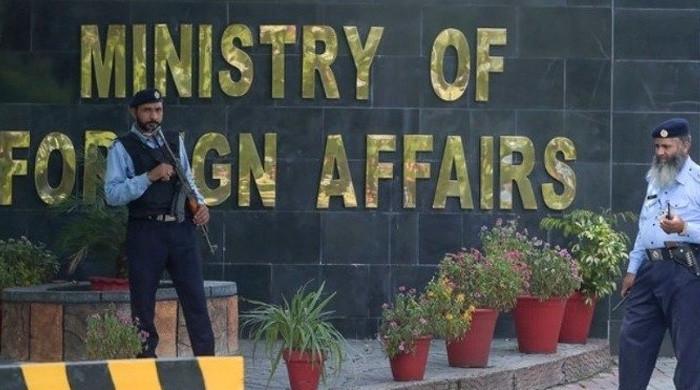MOFA Condemns Indian PM’s Remarks
The Ministry of Foreign Affairs (MOFA) voiced strong disapproval on Wednesday regarding recent statements made by Indian Prime Minister Narendra Modi. The ministry characterized the remarks as “inflammatory” and indicative of a recurring trend of historical distortion, internal oppression, and aggressive assertions.
According to the Foreign Office, Modi’s remarks represented a “concerning deviation from established international standards” and underscored the disparity between India’s actions in the region and its broader global ambitions.
The Indian Prime Minister escalated his rhetoric, portraying recent border incidents as a “calculated war strategy” rather than isolated acts of proxy conflict. Speaking at an event in Gandhinagar, Gujarat, on Tuesday, Modi cautioned that India would respond “appropriately” to any acts of aggression.
The MOFA statement expressed regret, stating it was “disappointing, yet not entirely unexpected, that the Indian Prime Minister has, once more, disregarded the ongoing issues of historical revisionism and the suppression of internal minorities to deliver another provocative address.”
The Foreign Office specifically addressed the Indian leader’s allusions to water resources, which are jointly managed under treaty agreements.
Modi asserted that concerns over water resources in Indian Illegally Occupied Jammu and Kashmir (IIOJK) and the Indus Waters Treaty had been “suspended,” accusing prior Indian administrations of neglecting dam upkeep and water infrastructure.
“His references to potentially using water as a weapon, despite it being a shared resource governed by treaty obligations, demonstrate a worrying departure from international protocols and highlights the contradiction between India’s regional behavior and its stated global aspirations.”
MOFA further asserted that evidence suggests that “the Indian government has connections to assassinations beyond its borders and subversive activities in other countries,” also describing India’s administration in Jammu and Kashmir as being “marked by systematic repression.”
“It is particularly ironic that a state which is engaged in such repressive conduct now tries to posture itself as a victim,” the ministry stated, further accusing the current Indian government of encouraging “mob violence,” “hate campaigns,” and “the targeting of religious minority groups.”
Pakistan has called upon India to uphold the “fundamental tenets of international law,” which include respecting sovereignty, adhering to treaty obligations, and exercising restraint in both language and actions. “While jingoism might garner applause during campaign rallies, it ultimately undermines lasting peace and stability in the region,” the statement cautioned.
The ministry concluded by appealing to the youth to reject divisive politics and instead contribute to “a future characterized by dignity, reason, and cooperative relationships in the region.”
The Indian premier’s inflammatory comments against Pakistan continue, despite a ceasefire agreement established between Islamabad and New Delhi following recent tensions between the two countries.
The two nuclear powers were involved in a brief but intense conflict after India initiated unprovoked missile strikes within Pakistani territory on the night of May 6 and 7, allegedly targeting militant camps linked to the attack in Pahalgam, which resulted in the deaths of tourists in the IIOJK.
The Indian strikes resulted in the deaths of several Pakistani civilians, including women and children.
Among other measures against Pakistan, New Delhi also unilaterally suspended the Indus Waters Treaty (IWT), an agreement facilitated by the World Bank in 1960.
In a measured and controlled response, the Pakistan armed forces initiated a significant retaliatory military operation, named “Operation Bunyan-um-Marsoos”, targeting numerous Indian military sites across various regions.
The Pakistan Air Force shot down six Indian fighter aircraft, including three Rafales, as well as dozens of drones. After at least 87 hours, the conflict, initiated by India, concluded on May 10 with a ceasefire agreement mediated by the United States.



Comments (0)
No comments yet. Be the first to comment!
Leave a Comment